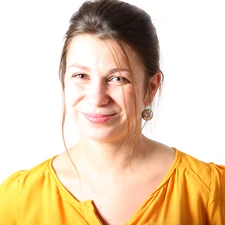Marie Violay

EMRP Earth Magnetism & Rock Physics
The 2017 Division Outstanding Early Career Scientist Award is awarded to Marie Violay for her outstanding research in the field of experimental rock physics and novel understanding of the role of fluids in fault mechanics and in geothermal systems.
Marie Violay’s research has opened up new methodologies that will allow experimentalists to add greatly to the fields of rock physics and rock mechanics. Violay’s primary research aim is to better understand the role of fluids on the mechanics of the Earth’s crust, especially rupturing. She is interested in developing new approaches combining experimental deformation and borehole geophysical observations for the study of earthquakes and geological reservoirs. Her experimental work is particularly meritorious for reproducing seismic slip deformation conditions in the presence of pore fluids under controlled conditions. It was argued, since the seventies, that fault weakening during earthquakes and landslides could be enhanced by the formation of a cushion of pressurised fluids trapped in faults (thermo-mechanical pressurisation). However, ideas on the precise role of fluids during seismic slip remained highly speculative, until her contribution. Indeed, she provided the first experimental evidence of thermomechanical pressurisation of faults at seismic deformation conditions. Two aspects of Violay’s research are particularly impressive. Firstly, she already managed, despite her young age, to work on several different topics: borehole geophysics, friction, rock deformation, and has made significant contributions in each time. Secondly, her experimental work not only involves the production of high quality data but, more importantly, fundamental technological improvements that open wide research perspectives way beyond geophysics. The best example of this is the presentation of a new cell for electrical conductivity measurements in a high pressure – high temperature apparatus. In recognition of her remarkable experimental abilities and her work on fluid-rock interaction, she has been recently hired as Assistant Professor at EPFL, with an impressive starting grant to build a rock physics laboratory to investigate fluid induced seismicity in geothermal fields.
